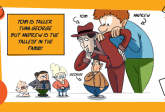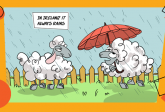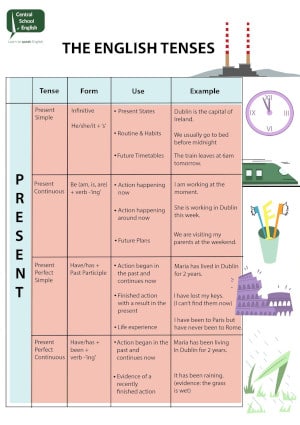Confusing English words
There are quite a number of confusing English words, which can be frustrating. Sometimes when we are talking to somebody, we get the wrong end of the stick!
To clear up any misunderstandings it is important to know the difference between words that are similar but different.
Some such words are: See, Look, Watch etc.
In today’s blog, from Central School of English, we will help you to avoid mixing them up.
Look at, Watch and See
Do you ever mix up the words “Look at”, “watch” and “see”?
It’s true that they are similar. We do all three actions with our eyes but they are slightly different.
We look at something which is still. In other words, we look at objects that are not moving.
We can look at a painting. We can look the wall. We can look at the stars.
However, we use watch for something that is moving.
We can watch a movie. We can watch a race. We can watch the clouds float by.
Both look at and watch are active verbs, meaning we do the action intentionally.
See, on the other hand, is an inactive word. It is something that happens without intention.
See can be used for both things that are still, and things that are moving.
We can see a show on TV. We can also see clothes in the window of a shop while we are passing by.
Look at, watch and see
We use to look at for something that is still.
We use to watch for something that is moving.
We use to see for something that is moving or still when we see something unintentionally.
Speak and Talk
Speak and Talk are some more words that people confuse.
So, what’s the difference?
First of all, Speak is more formal than Talk.
“Karen asked to speak to the manager.”
“I talked to my girlfriend for hours yesterday.”
Another difference is that we use speak for languages, whereas we do not use talk for languages:
“I speak English”
“I talk English“
Speak and talk
We use to speak for languages.
I speak English.
Test Yourself
Make sentences for the following situations using the correct verb.
Example: When I came home last night, I turned on the TV and _______ a comedy movie.
Answer: watched/saw
- The students went to the National Gallery museum and ________ some paintings.
- Every day, Simon leaves his house to go to work and when he comes back home he ________ some milk back.
- Marina had a job interview. When she arrived at reception she asked to _____ to the manager.
- If you study hard, you will be able to ______ English fluently.
Bring and take
Lastly, bring and take are words that also cause some confusion in the English language.
These verbs are almost the same but the correct verb depends on where the speaker is when they say them.
They describe moving things from one place to another.
If we are talking about a different place than we are in at the moment i.e there, we use take.
For example, If I am at home and I talk about the city centre I will use, there, and so I can say:
“Later, I will take my bag to the city centre to do some shopping.”
If I want to talk about here, i.e home, where I am now, I can say:
“When I finish shopping I will bring the shopping back home.”
So, bring means carry here, whereas take means carry there.
Test Yourself
Choose the correct verb to complete the sentences.
Phrasal Verbs
To clear up: To help people understand when they are confused. Example: The president cleared up the confusion about the new law.
To mix up: To confuse things with each other. Example: Sorry Sally, I mixed you up with Sarah because you are identical.
To pass by: To travel past something. Example: I passed by your house yesterday.
Idioms
Get the wrong end of the stick: to misunderstand something. Example: Michael got the wrong end of the stick and arrived a day early for the interview.
Test Yourself
Complete sentences using idioms and phrasal verbs from this post.
Did you enjoy our post? Check out about more confusing words and grammar in our grammar section.
Thank you for reading our post. You’ll find more English grammar tips elsewhere on our site and if you’d like information on our English courses in Dublin, please do not hesitate to contact us.





